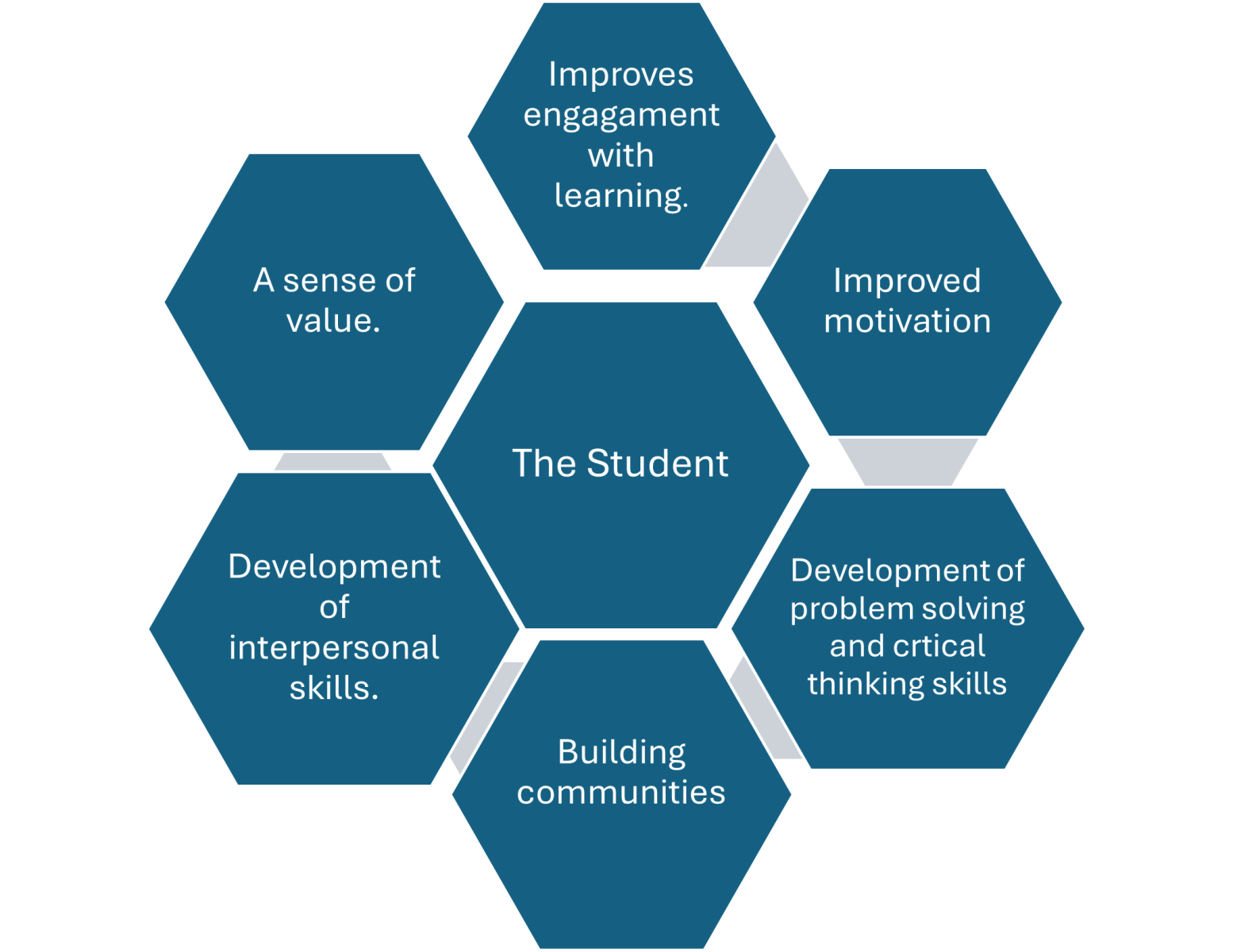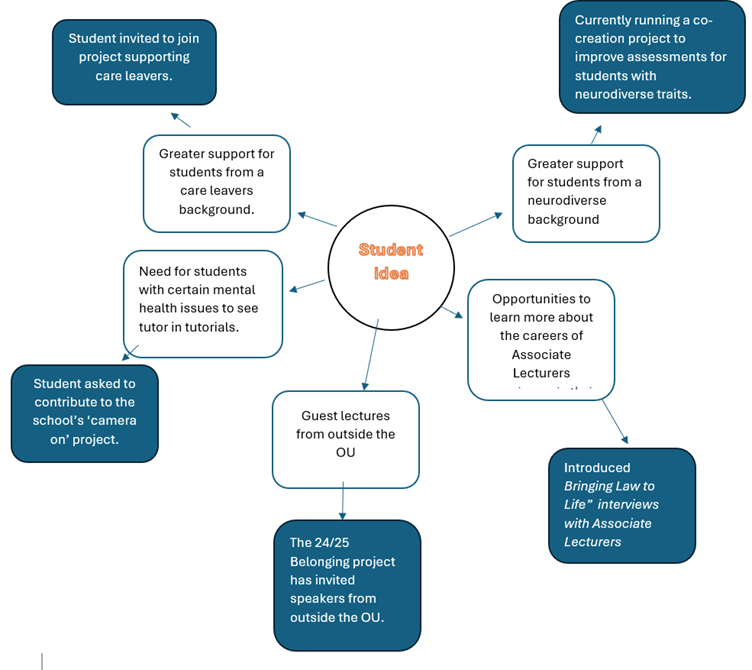From Feedback to Action: The Student Voice Festival in Law Education

By Carol Edwards and Liz Hardie
Reflecting on our careers over the last twenty-five years there has been an increasing regard for the ‘student voice’. Looking back at our previous education employment, we can both remember introducing questionnaires to elicit the student views and then the “You said, we did” boards (posters that identify suggestions that students have made and an indication of what the institution has done, often produced in a table format.)
At The Open University we have been involved in questionnaires, focus groups and forums, to name but a few ways of gaining the student voice and enhancing the provisions offered to the students as a result. More recently the idea of co-creation and students as partners has become increasingly common. We have had the opportunity to engage in several co-creation projects with students where it has been our privilege to learn from the students.
Student voice is a method which allows students to share their views and experiences. It is only from interacting with our students that we can start to appreciate the lived experience and promote meaningful change in our education practices (Holquist et. al., 2023). Student voice can give all learners a voice to transform education for the better (Islam 2012). For an organisation, listening to the students provides a better understanding of the student journey. It allows the people who actually experience the course, module or pedagogy offered, the opportunity to highlight the good points and also suggest areas for development. There are many benefits for incorporating the student voice for students who are willing to engage, as shown in the diagram below.

Figure one – Benefits of incorporating student voice.
However, developing a culture of student engagement in such activities can be problematic. Firstly, there is the balance of power: students may not feel comfortable sharing experiences and views with members of staff or other students. Equally, literature shows that usually the students who engage with student voice projects are the ones that are already engaged in the course, and that these projects risk missing out the marginalised and disenfranchised students who really are the ones we want to hear from (Bovill et. al., 2016). Finally, students can become disheartened if they feel they are constantly sharing their views and they are not being acted upon.
Our attendance at an HEA symposium on co-creation provided an opportunity to meet colleagues from Nottingham Trent University. They shared a project they had developed to gain student views on EDI in engineering via a student competition. We were inspired and, learning from their example, we decided to try their approach in The Open University Law School. Taking on board the need for our students to demonstrate key employability skills to potential employers, and the competitive nature of the legal field, we have therefore introduced The Law School Student Voice Festivals.
What is a Student Voice Festival?
The festival is an opportunity for students to enter a competition to make suggestions as to how we can improve the Law School’s teaching. Students are invited to submit a podcast, poster, leaflet or video recording answering the question posed. For example, in 2024 our question was – “How can we better support students who want to enter the legal profession, focusing on those for whom there may be additional diversity barriers and challenges?”
The festival is divided into two rounds. The first round considers the students’ idea, while the second round focuses on the students’ presentation skills. The first round is judged by a panel from the Law School including a student representative. A maximum of ten students are invited to the second round, which is a live online final. At the final the students present their ideas to a panel of judges from within the Law School, a student representative, and potential employers - thus giving the students the opportunity to start networking. The student presentation evening is open to all members of the Law School (staff and students) and an audience vote is included for one of the prizes. Prizes have been kindly donated from The Law School, solicitor firms and Inns of Court and included work placements, interview mentoring and vouchers.
Feedback from students who take part is positive and they have welcomed the opportunity to have their views heard. Students have commented on the “wonderful experience” offered and the value of hearing other speakers. Once the festival is complete the project team review the ideas presented and start working with the Law School Teaching Director to implement feasible ideas.
So, what have we done?
We have been running the festival for the last two years. The first festival focused on how the Law School could be more inclusive in their teaching and the second, employability. The diagram below shows some of the ideas and the action we have taken to implement the ideas: this is not an exhaustive list but does give an insight into the variety of ideas presented.

Figure two – Student ideas and action taken by the Law School.
Conclusion
Student voice is key in any institution. Fostering a culture where students feel confident making suggestions and see evidence of changes based on their feedback is, in our view, essential for cultivating meaningful student voice. The Student Voice festivals are still in their infancy, however the students who have taken part so far have been from a more diverse range of backgrounds than is typical in other forms of student consultation. We can also show students that we have acted and listened to them and, as the projects develop, impact will be demonstrated. We are planning our next Student Voice Festival in Autumn 2025 and are looking forward to hearing our students’ ideas.
References
Bovill, C., Cook-Sather, A., Felten, P., Millard, L., & Moore-Cherry, N. (2016) ‘Addressing potential challenges in co-creating learning and teaching: Overcoming resistance, navigating institutional norms and ensuring inclusivity in student-staff partnerships’ Higher Education, 71, 195-208. doi:10.1007/s10734-015-9896-4
Holquist, SE., Mitra DL., Conner J., and Wright NL (2023) What is student voice anyway? The intersection of Student Voice Practices and Shared leadership Educational Administration Quarterly 2023 59:4, 703-743
Islam, A. (2012). Afterword. The space between? The value of student voice from a student’s perspective. Management in Education, 26(3), 164-164. https://doi-org.libezproxy.open.ac.uk/10.1177/0892020612445703

Carol Edwards
Carol is a Senior Lecturer in Legal Online Pedagogy, Lead for Retention and Outcomes (Law) and Student Experience Manager. She is actively involved in the scholarship relating to online teaching pedagogy and has presented and published on this area. She has a very keen interest in tackling student and staff isolation and is actively involved in several projects attempting to address this area. These include the online mentoring programme, co-founder of The Belonging Project, with particular focus on developing student confidence. She is part of a pan-university team exploring belonging across the Open University.

Liz Hardie
Liz Hardie is Director of SCiLAB (the Faculty of Business and Law’s Scholarship centre) and a senior lecturer of the Open University Law School. She also works for the Open Justice Centre supervising law students carrying out pro bono projects both as part of their law degree and on an extra-curricular basis. Her research interests include online learning and the use of technology in legal education, including the impact of generative AI on teaching and access to justice. Liz is also interested in how to support students online to feel part of the academic community, and co-founded the Law School Belonging Project 4 years ago.

Blog posts
- Rethinking Tuition: Reflections from the Staff Tutor / Student Experience Manager (SEM) Symposium, 4-5 December 2024 6th June 2025
- ‘Hitting the keyboard’ : Exploring student feelings and approaches to developing legal research skills 9th May 2025
- From Feedback to Action: The Student Voice Festival in Law Education 15th April 2025
